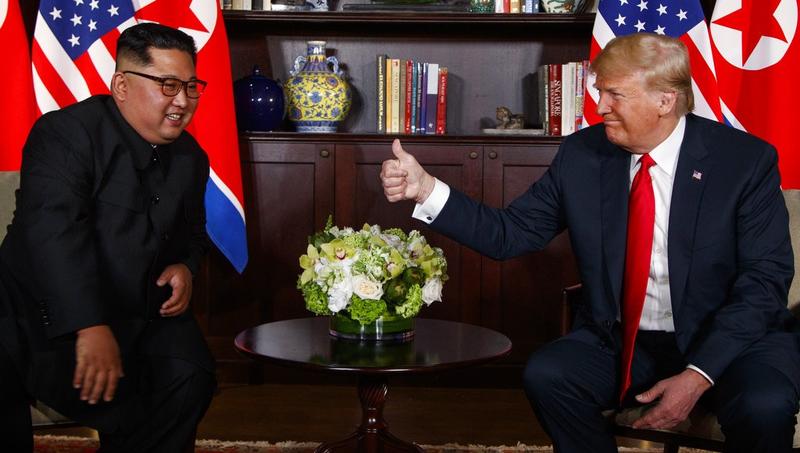Media Report

- The Wall Street Journal reports: "China is setting its sights on a key role in North Korea's future, seeking to be part of any peace treaty, weapons inspections and economic assistance, after emerging as a surprise beneficiary of the summit between the U.S. and North Korean leaders. Chinese officials are expected to stake out their positions for a post-summit North Korea when U.S. Secretary of State Mike Pompeo visits Beijing on Thursday to discuss the outcome of the talks between President Donald Trump and North Korean leader Kim Jong Un. At the top of China's agenda are an easing of the economic sanctions that pressured North Korea into negotiations and working on ways to provide security guarantees to give Pyongyang the confidence to dismantle its nuclear program. While China worried that its interests might get short-shrift in the Trump-Kim summit, the meeting unexpectedly proved favorable to Beijing. The summit's vaguely worded agreement to pursue denuclearization without providing details on how or when to achieve that goal gives Beijing time to lobby Washington, Seoul and Pyongyang for a direct role in negotiations, Chinese experts said."
- Politico reports: "President Donald Trump is expected to impose tariffs on Chinese goods as soon as Friday or next week, according to two sources briefed on internal deliberations, a move that is sure to further inflame tensions and spark almost immediate retaliation from Beijing. The administration on Friday is planning to publish a final list of Chinese goods that will take the hit. The aggressive stance calls into question the future of talks between the two trade powers, which took a friendly turn in the weeks leading up to the North Korea summit as the U.S. sought China's help. China was seen as playing a key role in getting North Korean leader Kim Jong Un to the table with Trump, who has consistently linked his trade demands to Beijing's willingness to help on North Korea."
- Bloomberg comments: "American officials have known for many years that China would eventually be a force to reckon with in global politics. But how rapidly and expansively that challenge has emerged has nonetheless been striking. How (should the U.S.) deal with a China that is putting U.S. leadership and international order under stress on a variety of fronts at once? Doing so will be no easy task, but neither should it be considered impossible. Although some observers argue that the U.S. and its allies have little choice but to stand aside as the Chinese juggernaut advances, the fact is that Washington and its friends still control a clear preponderance of global power. If they can get their act together, they ought to be able to protect their interests and defend the international system that has benefitted them all so enormously for the indefinite future."
Calendar
- 2018-06-12 China suggests sanctions relief for North Korea after Trump-Kim summit
- 2018-06-11 G7 chaos is a PR win for China
- 2018-06-10 China, Russia Solidify Growing Eastern Bloc as Trump Rattles G-7
- 2018-06-08 US expands China health alert after acoustic incident
- 2018-06-07 A Medical Mystery Grows as U.S. Consulate Workers in China Fall Ill
- 2018-06-06 What Facebook Shared With Chinese Hardware Companies: DealBook Briefing
- 2018-06-05 A Trump-Kim Deal Could Send China’s Trade With North Korea Soaring
- 2018-06-04 June 12 could be a big date for US-China ties — and not because of North Korea
- 2018-06-03 US, China End Latest Trade Talks Without Settlement
- 2018-06-01 Chinese stocks make symbolic debut on widely followed index
News
- Reuters U.S. soybeans plunge on renewed fears of trade war with China
- The Wall Street Journal The Unexpected Winner From the Trump-Kim Summit: China
- Politico Trump could slap China with tariffs as soon as Friday
- CBS News How Trump's North Korea pact may affect China tariffs
- The New York Times For Survivors of a 9-Hour Chinese Exam, a Door Opens to America
- Financial Times China's long-distance fishing fleet reliant on subsidies
- The Wall Street Journal A Chip in the Windshield: China's Surveillance State Will Soon Track Cars
- The New York Times Vanuatu Denies Chinese Wharf Poses Threat to Australia
- The Wall Street Journal Wall Street Firms Face a New $15 Billion Hurdle in China
- Financial Times China's current account at risk of deficit on trade shock
Commentary
- Bloomberg China's Master Plan: How the West Can Fight Back
- Fox News Ex-CIA officer: During Trump-Kim summit, China and Russia were surely spying
- Foreign Policy If Anyone Gets the Nobel, It's Moon and Kim
- Nature Magazine China sets a strong example on how to address scientific fraud
- The Economist China's exceptionalism rewrites the Western political playbook
- Real Clear Politics China's Deal Breaker: Property Rights
- Financial Times Global investors should follow China's lead in Africa
- NPR Examining China's Take On The Trump-North Korea Summit
- Financial Times China's Achilles heel lies with property companies
- BBC China's 'Kingdom of Women'
